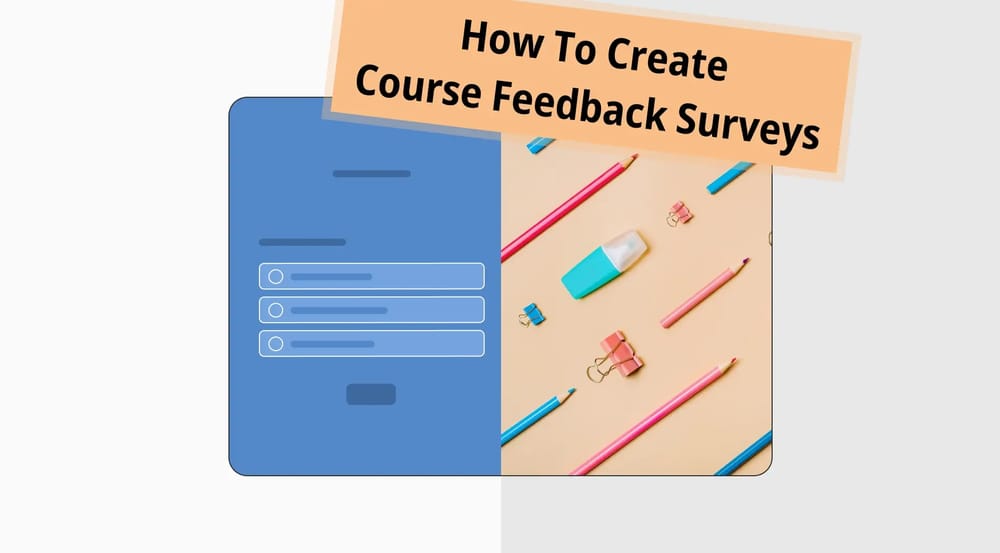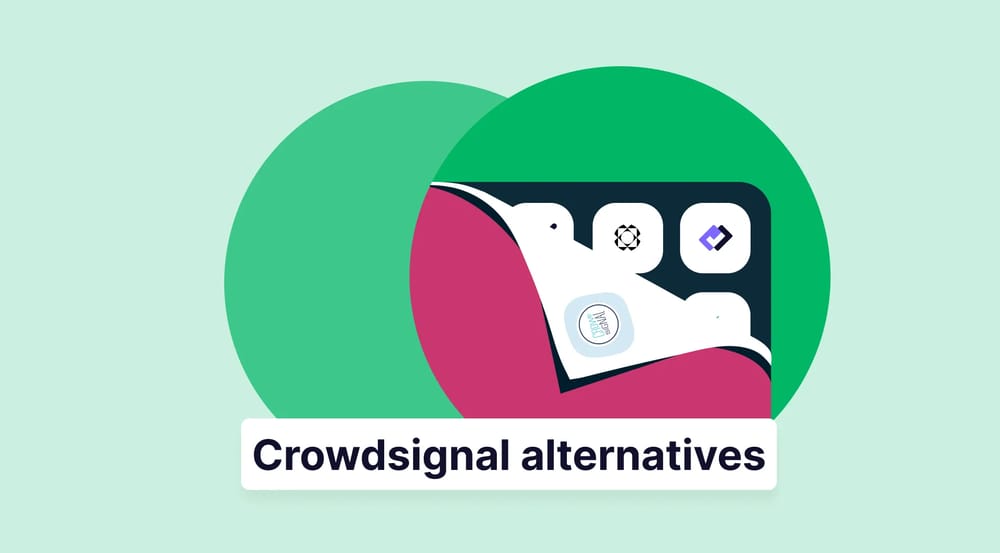All instructors and educational institutions around the globe are constantly looking for ways to improve their education quality. Course feedback surveys have become a splendid method to receive the best student feedback and course development.
In this article, you will learn what a course feedback survey is and understand why you need one. You will also learn how to create one for you with course evaluation examples. In addition, you will have 7 professional tips to create the best course feedback survey form possible.
What is a course feedback survey?
A course feedback survey is an assessment method commonly used by educators to assess the overall experience of a course.
When used student surveys for educational success, it becomes a super-efficient way for teachers and educational institutions to improve their education systems. Moreover, it is an excellent method to build high education standards by gathering worthwhile information on learning outcomes.
Why to use a course feedback survey
If you would like to take your education quality to another level, you must pay attention to the outcome. The best way to observe a course’s outcome is to utilize a well-designed course feedback survey form. Here are the key reasons why you should use a course feedback survey form:
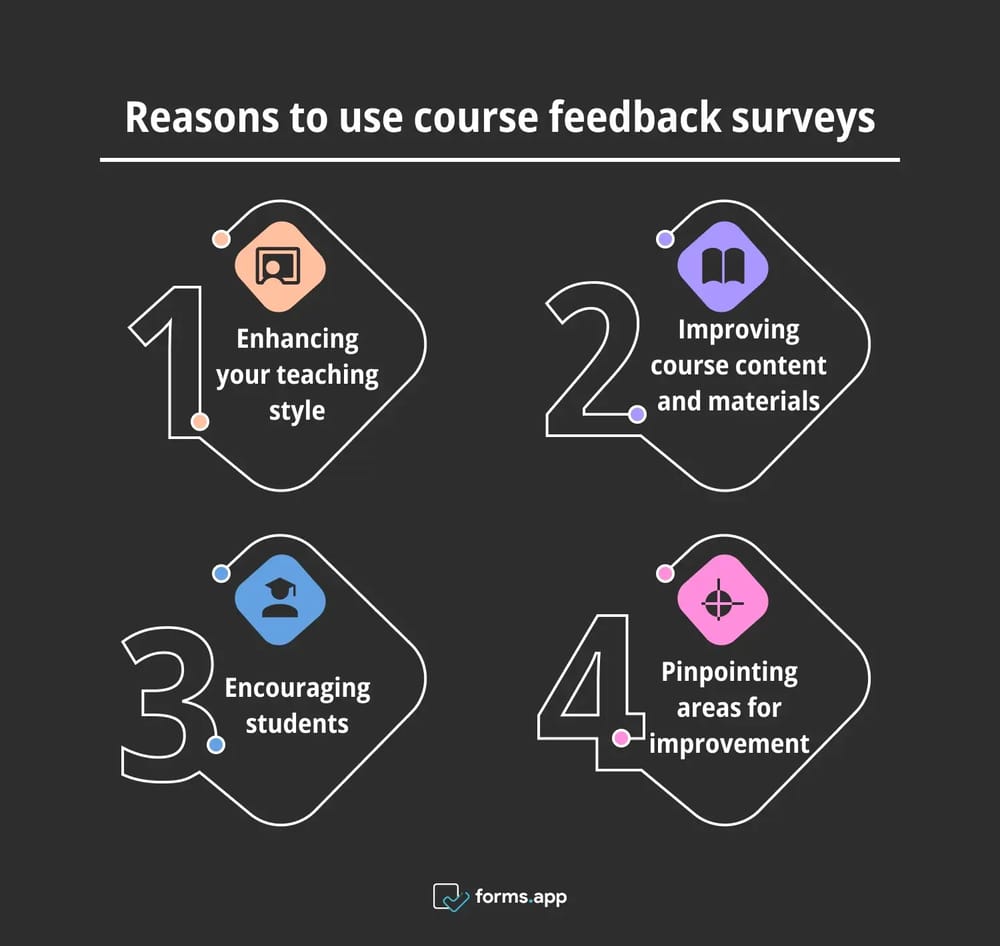
Benefits of using course feedback surveys
⏩Enhancing your teaching style: You may learn more about effectiveness of your teaching style. Making course feedback surveys regularly helps you to observe your teaching effectiveness and keep it updated to current standards.
⏩Improving course content and materials: Constructive feedbacks makes you sure if the content is clear and relevant. Also, it allows you to understand whether you need to use more materials or go ahead with the ones you already have.
⏩Encouraging students: Asking their opinions makes them feel valued with a sense of involvement in the educational process. This helps students to get motivated to actively participate in the courses.
⏩Pinpointing areas for improvement: Open-ended questions will enable you to spot specific points that are unnecessary. Identifying and removing confusing parts in the curriculum certainly increases the efficiency of the course.
20 Essential questions to use in your course feedback survey
We have mentioned why you should make use of a course evaluation form for teachers. In this chapter, we have prepared 20 essential sample questions with course evaluation sample answers. Even though you can use any type of course survey questions for students, you can use certain question formats to make it more engaging.
1. What were your learning objectives for enrolling in this course? (Open-ended answer)
2. What was your subject knowledge level at the start of the course and the end? (Multiple-choice)
- Limited at the beginning, Extensive at the end
- Basic at the beginning, Proficient at the end
- Novice at the beginning, Advanced at the end
- Other
3. Did the course materials complement each other, and how well did you understand the course material? (Multiple-choice)
- Strongly agree
- Agree
- Neutral
- Disagree
- Strongly disagree
4. How did assignments contribute to your learning and allow you to demonstrate your knowledge? (Open-ended answer)
5. What skills or knowledge did you acquire or improve? (Multiple-choice)
- Technical Skills
- Soft Skills
- Communication Skills
- Leadership Skills
- Problem-Solving Skills
- Time Management Skills
- Other
6. How many hours per week did you spend on this course? (Open-ended answer)
7. Which activities did you find most beneficial, and why? (Open-ended answer)
8. What aspects of the course did you find most or least enjoyable? (Open-ended answer)
9. Which topic(s) would you have liked additional or follow-up content for? (Open-ended
answer)
10. How prepared was the instructor for each class and the course?
- Very prepared
- Prepared
- Neutral
- Unprepared
- Very unprepared
11. The instructor fairly assessed student learning (e.g., through quizzes, exams, projects, and other graded work). (Star-rating)
12. The instructor treated students with respect during the entire course process. (Star-rating)
13. The instructor’s feedback on assignments was sufficient and beneficial. (Star-rating)
14. The course helped me improve on the main topic. (Star-rating)
15. This course has increased my interest in this field of study. (Star-rating)
16. This course has challenged me to learn more than I expected. (Star-rating)
17. What aspects of the class were obstacles to your learning? (Open-ended answer)
18. How would you rate your overall experience with the course? (Rating-scale question)
19. How likely will you recommend this course to a friend or colleague? (Rating-scale question)
20. Do you have any additional feedback or comments about this course? (Open-ended answer)
How to create a course feedback survey (without coding)
In forms.app, creating a form takes less time than you may think. As well as saving time, you will benefit from taking the least effort to create any form with our step-by-step guidelines. Here are the essential steps for creating a course feedback survey form:
Step 1: Log in or create a new account
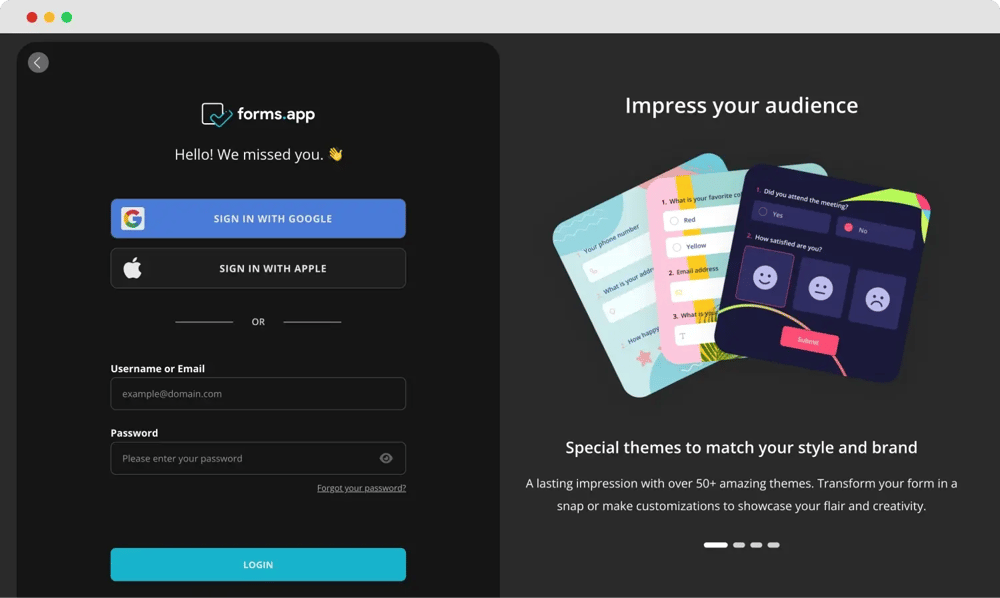
Create a forms.app account
As a first step, you can create a free account in seconds if you don't have one. You can go directly to the platform if you already have an account. Apart from these, you can also log in via Google, Facebook, and Apple accounts.
Step 2: Select a free template
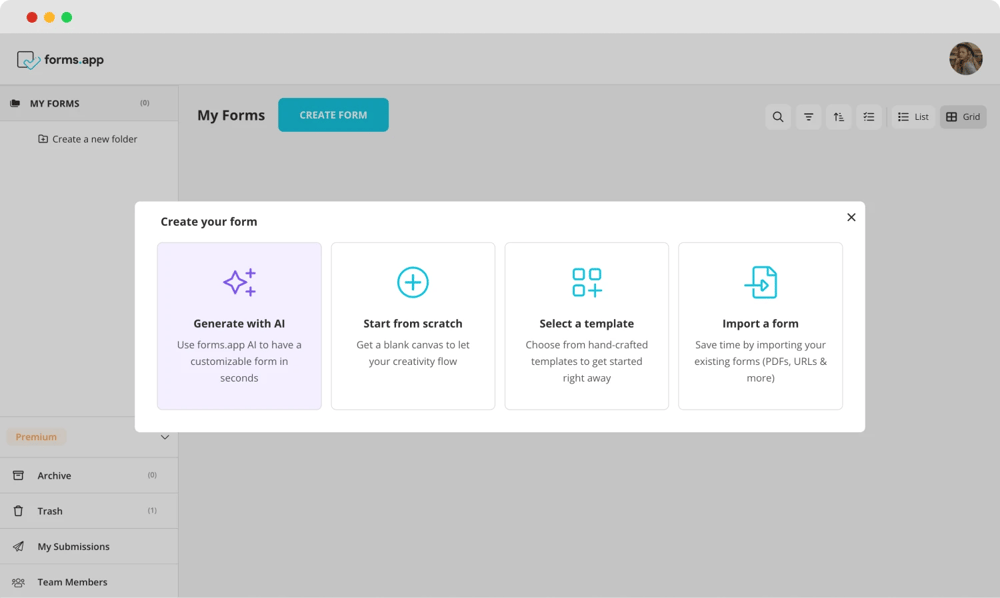
Choose a beginning option
You can start from scratch if you would like to decide on every element from the beginning. If you would rather save time, you can select one of the course feedback survey templates. This way, you can customize the details that matter most to you. Alternatively, you can create a form with forms.app AI in seconds.
Step 3: Add your own questions
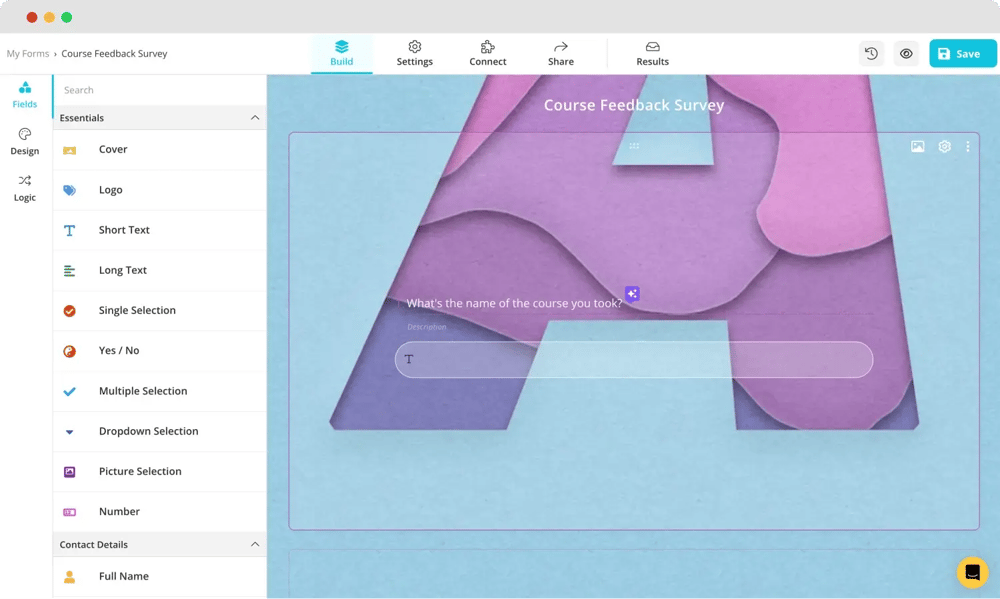
Add your course feedback questions
Once you choose a template, you can add your own course evaluation survey questions and also questions we have already prepared for you in this article. Also, using forms.app's AI feature to reword the questions and provide you with alternative answers is also an excellent assistance.
Step 4: Customize your form design
Now that you have added your questions, it's time to customize your survey’s design. You have plenty of options to style your survey the way you wish.
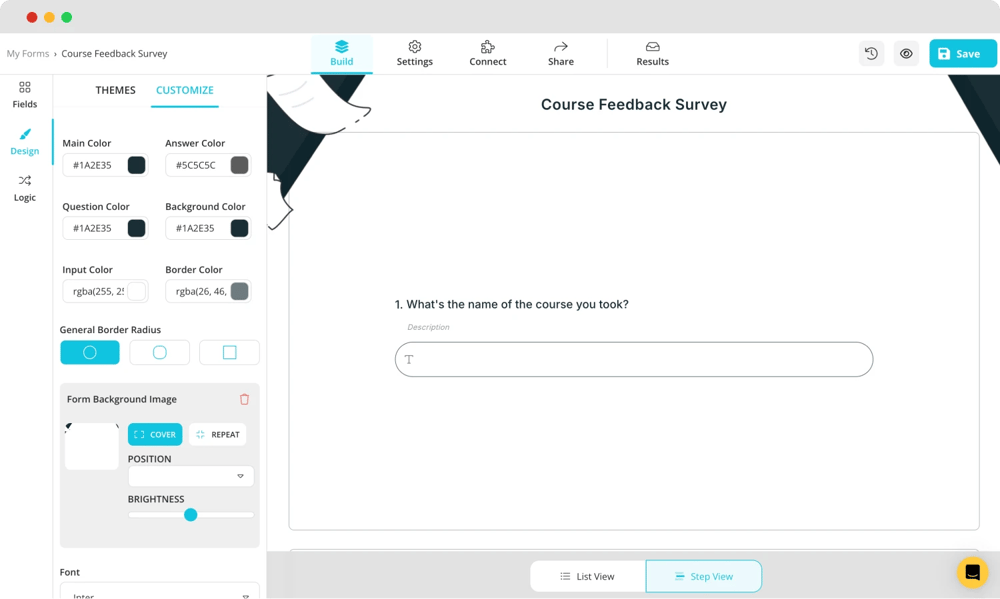
Customize your feedback form
The design field offers many options for styling your survey. You can easily select a theme and change colors. You can also upload your form images, logo, and cover. Additionally, you can tailor colors, fonts, and other overall design elements to create a survey.
Step 5: Share your form
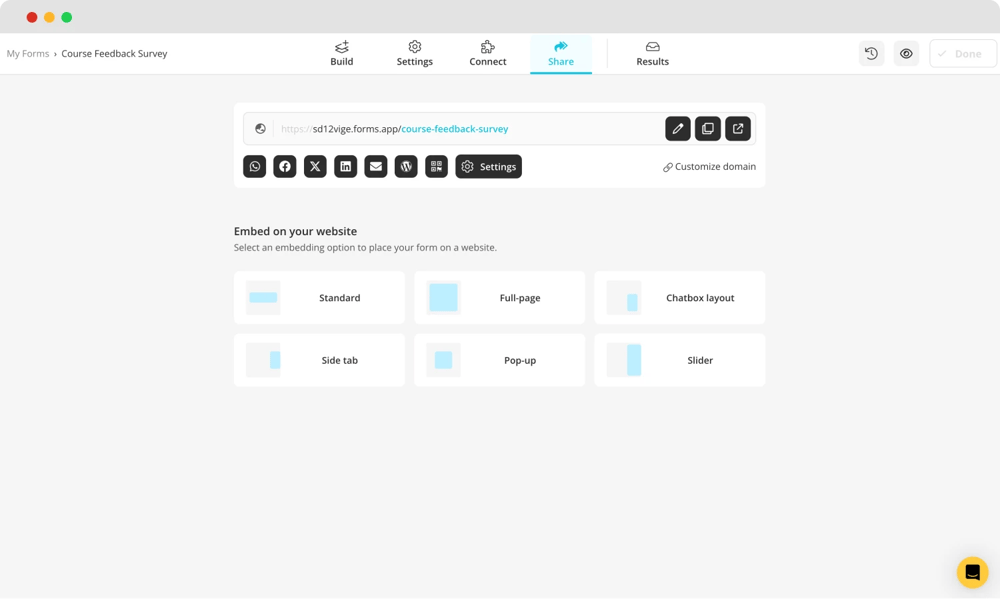
Share your survey
After customizing your form design, you can choose to embed the form on your website or share it across all digital platforms. Within the settings, you have the option to configure privacy levels, such as public, restricted, or private. You can also customize how the form is displayed on your website when you share the link.
Step 6: Analyze the results
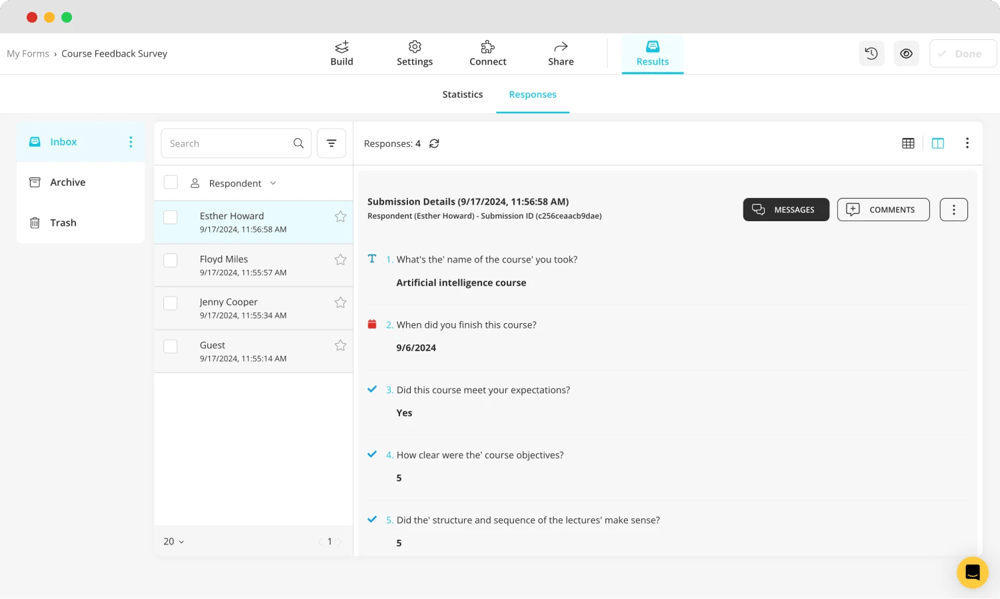
Analyze your survey results
At the final stage, it is time to analyze your collected feedback. To maximize your efficiency, it is highly recommended that you review and evaluate the feedback. forms.app provides you with a great tool to analyze the responses thoroughly. Do not forget to look at the ‘’Results’’ section to review your data in detail.
7 Expert tips while creating a course feedback survey
We have mentioned the benefits and reasons for using a course feedback survey form. However, there are essential elements to consider while creating a course feedback survey form. This section contains seven crucial tips we have prepared to create the most beneficial and professional form possible.
🔐Show your sensitivity to privacy and anonymity: We all know well that people make more honest remarks when their identities are hidden. Make your participants sure that you do not ask for any information such as name, surname, email address, phone number, etc.
👨🏻🏫Manner matters: Ask about instructors’ and the institution’s manner. Having sufficient materials and essential resources is not always enough. The instructor's manners can dramatically affect students’ overall experience.
Add descriptions: You can give information about the form. Not everyone can fill out forms perfectly. To avoid misunderstandings, add small tips about your questions and desired answer patterns.
💬Get into details: To make the most out of feedback surveys, try to ask students’ opinions about a specific topic or incident that happened in the course.
🖼️But don't miss the bigger picture: Delving into specifics is substantial in assessments. However, there are also general parts to learn about, such as teaching methods, strategies, practices, course materials, student engagement, course structure, etc.
🎯Be straightforward: No one likes filling out a survey with confusing and thought-provoking questions. Short, simple and straightforward questions can keep the reader in the survey. Ask your questions in a direct manner with certain and clear answers.
🗣Keep a professional tone: When adding your own questions to the survey, it is important to keep your tone always formal and professional.
Wrapping it up
In summary, course feedback surveys are a widely used technique for evaluating a course’s quality. Both students and teachers significantly benefit from using a course feedback survey. While students can express their sincere and genuine opinions on the course, teachers can gain a clear understanding of what is working well and the course level.
In this article, we have covered what a course feedback survey is, why you need one, and a step-by-step process for creating one. Last but not least, we have mentioned professional tips for the best course feedback survey form with open-ended course evaluation questions. It is now up to you to use this form to give your students the best learning experience.
forms.app, your free form builder
- Unlimited views
- Unlimited questions
- Unlimited notifications
